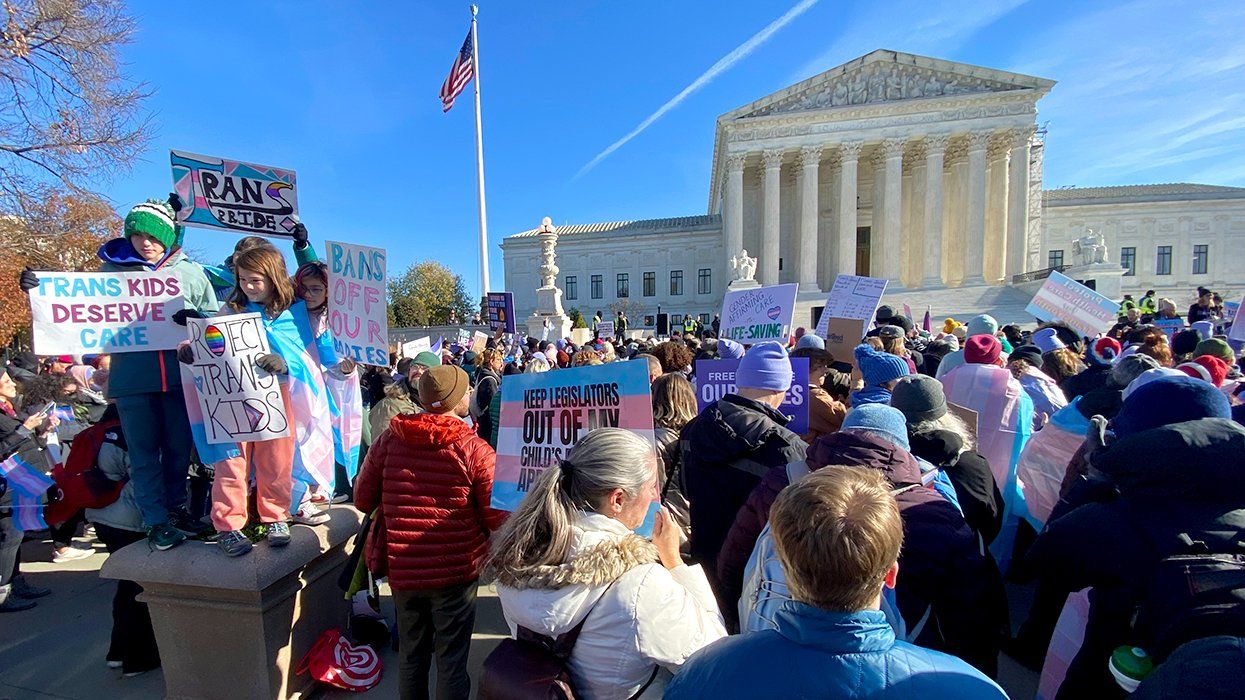Despite skepticism from conservative justices, LGBTQ+ groups are expressing cautious optimism that the U.S. Supreme Court will rule in favor of transgender youth’s access to gender-affirming care.
Keep up with the latest in LGBTQ+ news and politics. Sign up for The Advocate's email newsletter.
The court Wednesday heard oral arguments in U.S. v. Skrmetti, a case challenging Tennessee’s law banning puberty blockers and hormone treatment for people under 18 with gender dysphoria, which allowing it for cisgender minors with other conditions. The law also bans gender-affirming surgery, which is rarely performed on minors, but the lawsuit does not challenge this.
Tennessee Gov. Bill Lee, a Republican, signed the ban, Senate Bill 1 into law in March 2023. The following month, three families with transgender children and one doctor filed a federal lawsuit challenging the ban. The suit was brought by Samantha and Brian Williams of Nashville and their 15-year-old transgender daughter, two other plaintiff families filing anonymously, and Dr. Susan Lacy of Memphis. They are represented by Lambda Legal, the American Civil Liberties Union and its Tennessee affiliate, and the law firm of Akin Gump Strauss Hauer & Feld LLP. The suit was filed in April 2023 in U.S. District Court for the Middle District of Tennessee. The case was known as L.W. v. Skrmetti until the Biden administration joined it, and it is now U.S. v. Skrmetti. Defendants include Tennessee Attorney General Jonathan Skrmetti and other state officials.
Related: Meet the transgender lawyer leading a bold fight to show Supreme Court justices that trans lives matter
In the hearing Wednesday, ACLU attorney Chase Strangio, the first out trans person to argue before the high court, and U.S. Solicitor General Elizabeth Prelogar argued that the law discriminates based on sex and therefore must be struck down. Justice Neil Gorsuch, an appointee of Donald Trump who nonetheless wrote the 2020 ruling in Bostock v. Clayton County that anti-trans discrimination is sex discrimination, was notably silent during the hearing. Conservatives Brett Kavanaugh and Samuel Alito were skeptical about gender-affirming care, while the court's three liberals, Sonia Sotomayor, Elena Kagan, and Ketanji Brown Jackson were supportive.
Representatives of civil rights groups released statements saying they are optimistic that the high court will conclude that the Tennessee law “discriminates based on sex and must therefore be held to a higher level of scrutiny.”
“I am encouraged by the arguments before the Court, as the justices had the opportunity to directly engage with the real-world harms that discriminatory laws have on the health and well-being of transgender young people and their families,” said Casey Pick, director of law and policy at the Trevor Project. “The Trevor Project regularly hears from young people across the U.S. about the life-saving nature of the medical care at risk in this case. For any parent, it is unimaginable to think of the government telling you that you can’t give your child the medicine they need to stay healthy. But that is exactly what Tennessee’s law says to parents with transgender children.”
“The plaintiffs ... made a strong case that this law discriminates by barring medications based solely on a person’s birth sex,” said Shannon Minter, vice president of legal at the National Center for Lesbian Rights. “The State of Tennessee had no effective response to that obvious fact, which several Justices made clear. Based on [Wednesday's] argument, we are hopeful the Court will rule that Tennessee’s law discriminates based on sex and must therefore be subject to the same high standard of review applied to all other sex-based laws. That would be a huge victory and would provide clear guidance for the lower courts about how to evaluate these laws.”
“[Wednesday's] argument powerfully showed how these bans unfairly target transgender adolescents and deny them medications that all other adolescents can obtain when medically indicated. You don’t have to know about health care to know that these bans are not about medicine — they are about discrimination,” said Jennifer Levi, senior director of transgender and queer rights at GLBTQ Legal Advocates and Defenders. “They insert politicians between families and medical providers and block parents from getting their transgender children the health care that allows them to be healthy and thrive. The stigma and discrimination baked into these laws is intentional, clear, and devastating.”
“The arguments at the Supreme Court made it unequivocally clear: banning medically necessary care for transgender youth is unlawful discrimination that puts their health and well-being at risk,” said Naomi Goldberg, executive director of the Movement Advancement Project. “Tennessee is one of 24 states that have taken away families’ freedom to obtain essential health care for their transgender child. These are decisions that rightfully rest with doctors, families, and patients — and based on the case laid out in yesterday’s arguments, we’re hopeful that the Court will see these bans for the discriminatory laws they are.” Two other states ban surgery only.
“The plaintiffs’ arguments on Wednesday made a powerful case for ensuring that transgender youth can receive the medical care they need,” said Dr. Kellan Baker, executive director of Whitman-Walker Institute, an LGBTQ+ health-focused research organization. Solicitor General Prelogar shared the story of Ryan Roe, whose gender dysphoria was so severe that he was throwing up daily and almost became mute because of the intense distress he experienced at the sound of his own voice. When Ryan’s parents were able to get him the care he needed, he started thriving — but then Tennessee took that care away. Though this care is supported by every major medical expert organization, transgender youth and their families in two dozen states are facing the same cruel denial of care that Ryan experienced. We hope the Supreme Court will issue a ruling addressing the discrimination inherent in these dangerous bans.”
A ruling will likely not come down until next summer.















